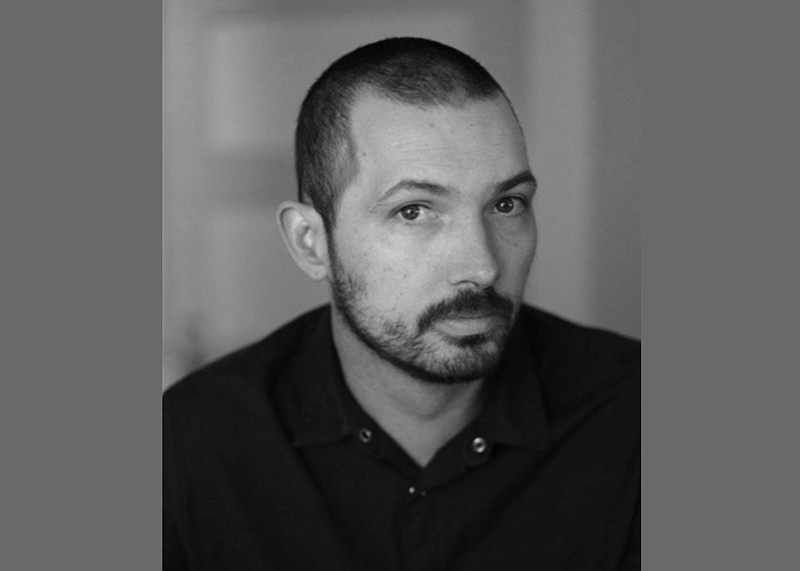When writer-director John-Michael Powell presents his feature debut “The Send-Off” at 6:30 p.m. Thursday at the Arkansas Museum of Fine Arts on 501 E 9th St, he’ll be returning from Los Angeles to the city where he first fell in love with movies.
Tickets for the screening are $15, and Powell will be on hand for a Q&A afterward. “The Send-Off” won the Audience Award at the 2022 Arkansas Cinema Society’s Filmland event, and Powell picked up a Panavision New Filmmaker Grant. (The ACS and the Museum are co-sponsoring tonight’s event).
“At the time when you’re in high school, you can’t wait to get out, ” Powell, a graduate of Little Rock’s Catholic High, says, remembering “growing up in the heat of the South [and] wearing a button-up shirt and a tie every day.”
“But now, I look back on my time at Catholic, I feel so fortunate to have known Father [George] Tribou and to have learnd something from him.
“I’ve got to give him credit because he would do this thing where we would have a study period after lunch, and he would put a movie on the TVs in every room to watch. Everybody hated them because it was always ‘Mutiny on the Bounty’ or ‘Inherit the Wind.’ It was all these old classics, and I swear I loved them.”
Like David Lean (“Lawrence of Arabia”), Robert Wise (“The Sound of Music”) and David Lowery (“A Ghost Story”) before him, Powell started out as an editor. He edited five episodes of “Dear White People,” “It Happened in L.A” and other projects. He advises others who want to get behind a camera to start in the cutting room.
“You learn how to close your eyes and hear the rhythm of a movie, that means understanding the structure and the way every beat in a scene should feel and sound. Being an editor affords you as a director to be ultra efficient and ultra technical.”
In addition to discovering DVDs and VHS tapes in the ’90s, Powell has a more personal reason for his obsession with cinema and with acting. His great-uncle was Dick Powell, the star of dazzling, surreal musicals like “42nd Street” and also the leading man of several hard boiled detective movies.
The elder Powell, a native of Mountain View, also had the misfortune of directing the unintentionally hilarious “The Conqueror,” where John Wayne had great difficulty passing for Genghis Khan.
Dick died in 1963, but his impact on his great-nephew is indelible.
“I grew up kind of mythologizing him. I guarantee I was the only kid on the block in the 80s watching Dick Powell movies, but I did because he was in the family. He was this great example of this song and dance man who needed to reinvent himself with all the Philip Marlowe pictures that he did. I never knew him as a human. I only knew him as the characters he played, but it felt very much like I knew him. I’ve always been fascinated with acting and the sense that I have a hard time defining the human being from the character they play,” the director recalled.
That’s evident in “The Send-Off.” Emmy-winning actor Dan Richards (Zachary Ray Sherman) holds a massive party to celebrate his departure from Hollywood. The festivities quickly turn sour because the host can’t seem to muster the decency to enjoy a little debauchery. When one considers that his idol is James Dean, it’s hard to tell if anything he says or does is just an act.
If “The Send-Off” sounds potentially morose, Dean’s ghostly advice and the third-wheel presence of Clayton (Sean Harrison Jones) offer more levity than the booze. Powell said simply making the film offered him and others the chance to get past a rough time in Tinseltown.
“My friends and I were feeling kind of claustrophobic about the pandemic. I think when we made the film it was right around the time when the delta variant was raging, and everybody was stuck in their house, so my friends and I decided to make a movie together to get through the pandemic,” he recalled.
The movie also let Powell and his collaborators explore how people like Dan can use their stardom to mistreat those around them. Dan idolizes James Dean, and that’s not a good thing.
“The film deals with power structures and the way these power structures can be abused. It was a sign of the time when we made it. The pandemic was such a huge volatile time in everyone’s life,” Powell said.
He also added that just about any place can have a Dan Richards and that you can see his Arkansas roots even in a movie set entirely in Los Angeles.
“So much of the comedic timing and the dark humor is straight out of my family,” Powell says. “I have that kind of defiant loudness in me, and I think it’s in the movie, too, and I think it’s how I confront power structures. “
The filmmaker does see one clear sign of hope on the horizon.
“That’s one good thing about how Hollywood has changed: I don’t think John Wayne would get cast as Genghis Khan today. “
